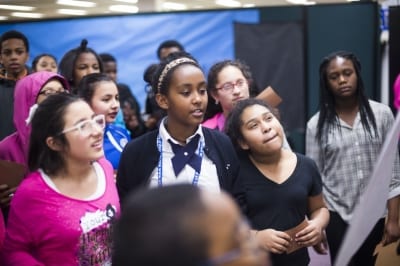JUMP TO:
Growing Together
March 1, 2017
Amy Nakamoto
I started my career in youth development in an AmeriCorps program, working in-school and afterschool in Boston’s public education system. I worked in settings almost exclusively with young people of color from communities whose range of economic profiles could be described as low-income to extreme poverty. The experience taught me that I had a lot to learn about myself, as well as the complexities and injustices of education, race, and equity.
Following that one-year AmeriCorps program, I sought to ground my early career experience in the broader field of education in order to understand what youth need to thrive and what dynamics serve to undermine those needs. I wanted to immerse myself into the infrastructure of programs that produce the intangible look of pride and sense of self when a student discovers they can do or be something they hadn’t previously imagined.
I found there were many different approaches. And today, as a program officer at the Meyer Foundation, I find that still holds true. The field today is vast – extended day, afterschool, and out-of-school time are just a few terms that describe the supports that exist to engage young people during critical non-school hours. Programs range from targeted (STEM, reading) and seasonal supports, to holistic approaches, to two-generational models that engage parents and youth. There are also many in-school approaches that work to advance social, emotional, and academic development.
Meyer has been a long-time funder of youth and education, and has continued to support numerous meaningful, quality youth programs in the Greater Washington region for over seven decades. Our region is home to organizations that represent myriad interventions and program models making a difference in the lives of youth.
As Meyer shifts strategically to further embrace a regional approach and have an impact on an intersection of pressing needs in our community, we’ve deepened our discussions about what we are able to support through grantmaking under the heading of youth development. We are also examining the expanded role we can play as a philanthropic voice who cares deeply about the academic, social, and emotional growth of our region’s youth.
Research and best practice tells us that high-quality programs provide for youth a feeling of emotional and physical safety, foster a sense of belonging, allow for quality peer and adult relationships, instill a sense of self-worth and confidence, and provide opportunities and structure for youth to learn new skills and feel a sense of pride in that learning. These important tenets have shaped a portion of our funding criteria we are now using in our grantmaking decisions.
Our stated criteria of what we will consider for support are organizations that employ a deep-engagement model of programming defined by working with youth multiple times per week, hold programming over the majority of the school year and summer weeks, and are structured in a manner that youth can sustain relationships and build skills over multiple years. In all funding decisions, we consider our overall docket and strategy, numbers served, impact and outcomes measurement, strength of organizational leadership, and capacity to partner effectively when necessary.
Candidly, we are still wrestling with this conversation. We have room to grow as a funder and partner to youth in the region. We want to ensure we are supporting quality organizations located in the most vulnerable neighborhoods, led by an increasing number of leaders of color, and are embedded with advocacy efforts, data sharing, accountability, and systems building.
Grantmaking alone is not where our investment in youth organizations ends. Through convening and advocacy, collective action, and capacity-building strategies, we will continue to lift up the important work organizations are doing that allow a young person a sense of connection and belonging from a very young age, all the way through college and career readiness, and on to living-wage earning work.
My own career has allowed me to see the field of youth development from various angles. I know that no matter the approach to support, when you meet a young person where they are, it serves as a solid foundation for growth. As Meyer continues to hone in on our approach to youth development, we hope to grow right along with our partner organizations and the youth they serve.
 Amy Nakamoto is a program officer at the Meyer Foundation with an overall focus on Northern Virginia, and specific focus on youth development in DC. Previously, she served as executive director of DC Scores, one of the region’s largest afterschool organizations from 2006-20014, and served on the board of directors of DC Alliance of Youth Advocates from 2007-2014.
Amy Nakamoto is a program officer at the Meyer Foundation with an overall focus on Northern Virginia, and specific focus on youth development in DC. Previously, she served as executive director of DC Scores, one of the region’s largest afterschool organizations from 2006-20014, and served on the board of directors of DC Alliance of Youth Advocates from 2007-2014.

